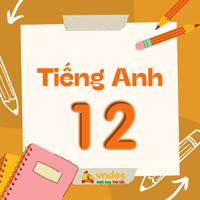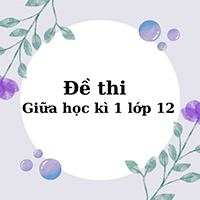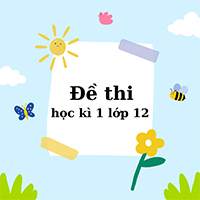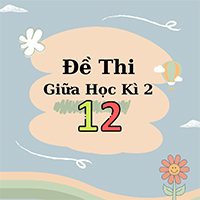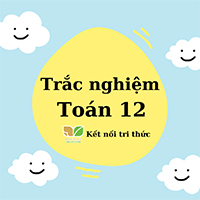Tiếng Anh 12 Bright Unit 6 6c Listening
Giải tiếng Anh 12 Bright unit 6 6c. Listening trang 70
Giải SGK tiếng Anh Bright 12 unit 6 The green movement 6c Listening bao gồm đáp án chi tiết các phần câu hỏi trong student book Anh 12 Bright giúp các em học sinh dễ dàng chuẩn bị bài tập tại nhà hiệu quả.
1. How often do you engage in discussions about green environment? Where and with whom? Bạn có thường tham gia vào các cuộc thảo luận về môi trường xanh không? Ở đâu và với ai?
Đáp án
I often engage in discussions about green environment twice a week during the recess with my classmate.
2. You are going to listen to four dialogues. Read the questions and the answer choices in Exercise 3. Which dialogue takes place ... Bạn sẽ nghe bốn đoạn hội thoại. Đọc các câu hỏi và các lựa chọn trong bài tập 3. Đoạn hội nào xảy ra ở…
• at someone's home?
• in a classroom?
• at a fair?
• at a newsagent's?
3. Listen to the dialogues. For questions (1-4), choose the best answers. Lắng nghe các đoạn hội thoại. Với các câu hỏi (1-4), chọn đáp án đúng nhất.
1. James and Annie are talking about recycling. What kind of recyclable waste will their local council collect?
A. metal B. plastic C. glass D. organic
2. Tom and Lucy are talking about some eco-friendly products and activities. What will they do first?
A. buy eco-friendly souvenirs B. eat organic street food
C. attend an environmental workshop
D. sign up with a charity
3. Two students are preparing a school project. What topic do they choose?
A. air pollution B. climate change
C. energy waste D. water pollution
4. Two friends are discussing an article about a new green energy project. Which energy source will the project involve?
A. solar power B. geothermal energy
C. biomass fuel D. hydroelectric power
Đáp án
1. B
2. A
3. D
4. D
Nội dung bài nghe
Dialogue 1.
(J = James, G = Girl)
G: Where are you James?
J: I'm in the kitchen organising our rubbish so I can take some things to the recycling centre in town.
G: Oh I see. So what are you taking?
J: Well I've got a box full of metal tins here and some glass bottles as well.
G: And what do you do with our plastic and organic waste?
J: I don't need to take plastic waste as the local council will collect it. As for my organic waste I'm going to use it in the garden.
G: What a great idea!
Dialogue 2.
(T = Tom, L = Lucy)
T: Wow! There are so many great stalls at this fair Lucy.
L: You're right Tom and all of the products on offer are eco-friendly.
T: There are lots of food stalls over there. Perhaps we will visit those later.
L: Sounds good. I'd also like to attend an environmental workshop. There's one in an hour from now. I might go and sign up to volunteer with a charity as well.
T: Sounds great. Before we do anything else though I think I'm going to buy some gifts for my family. Look I can get this reusable coffee cup for my mum and this recycled tea shed for my brother.
Dialogue 3.
(B = Boy, G = Girl)
B: So for our project Miss Harris said that we should write about a major environmental issue in our area.
G: Okay. What about air pollution due to traffic?
B: I'm not sure. It's a major issue in our town though. I think perhaps we could discuss climate change or energy waste.
G: I think water pollution is the right option. I've seen a lot of letter on the local beach recently.
B: That's a good point. Okay. Let's choose that topic for our project then.
Dialogue 4.
(B = Boy, G = Girl)
G: What are you reading there?
B: This newspaper has an article about a new green project that the local government is planning. They want to use alternative energy sources to pass on parts of our city.
G: That's great news. Will they use solar power then?
B: Actually no. At first they wanted to use biomass fuel but they changed their mind about a week ago. The city council discussed using geothermal energy but in the end they decided on hydroelectric power because they're a major water sources nearby.
G: That makes sense.
4. You are going to listen to a podcast about tidal energy. Read the note. What type of word is missing in each gap? Bạn sẽ nghe một chương trình radio kĩ thuật số về năng lượng thuỷ triều. Đọc ghi chú. Loại từ nào bị thiếu ở mỗi chỗ trống.
THE POTENTIAL OF TIDAL ENERGY
What is it?
• Utilising the power of 1) _____ to generate electricity
How is it useful?
• Providing a 2) _____ flow of energy all the year round.
• A practical option for 3) _____ that want to use green energy
Where can it be best utilised?
• In places where oceans and seas are 4) _____ like Vietnam
• Vietnam could lead the way in tidal energy 5) _____.
Đáp án
1 - noun
2 - adjective
3 - noun
4 - adjective
5 - noun
5. Listen and fill in the gaps (1-5) in Exercise 4. Write NO MORE THAN TWO WORDS for each answer. Lắng nghe và điền vào các chỗ trống (1-5) trong bài tập 4. Viết KHÔNG QUÁ HAI TỪ cho mỗi câu trả lời.
Đáp án
1. tidal waves
2. consistent
3. developing countries
4. easily accessible
5. production
Nội dung bài nghe
(I = Interviewer, D = David)
I: Hello and welcome to our podcast. Today, I'm talking to David Walters, an environmentalist about tidal energy, which is crucial for developing a green environment. So David, can you tell our listeners a bit about tidal energy?
D: Sure, tidal energy is a renewable source of energy that is produced using the natural power of ocean tides. The movement of the tides causes underwater turbines to turn, and this generates electricity.
Interviewer:
I: And what are its benefits?
D: Well, it is clear that tidal energy provides a consistent flow of power all year round.
I: How is that?
D: Well, aside from being a clean energy source, it can also be used regardless of the weather conditions and offers a consistent supply flow of power throughout the year. That makes it an extremely useful option for developing countries looking for sustainable energy sources.
I: So where could it be most useful?
D: Well, tidal energy can make a big difference in places where oceans and seas are easily accessible. For example, Vietnam is one of the countries that has great potential for tidal energy. With its long coastline, Vietnam has a huge amount of tidal energy that can be utilised. In fact, experts believe that Vietnam's coastal tides could produce enough energy to power millions of homes. With the right investment and infrastructure, Vietnam could become a leader in tidal energy production.
I: Amazing. It sounds like tidal energy could be a real game-changer for countries that are hoping to move towards renewable energy sources in the near future. Well, it's time for a quick outbreak now. When we come back, we'll discuss the effects of a...
FUNTIME
Look at the picture. Circle the correct phrasal verb. Nhìn vào bức tranh. Khoanh tròn vào cụm động từ đúng.
If you drop out/ drop off the rubbish of the recycling bin, I will be very pleased.
No problem!
Đáp án
drop out
Hướng dẫn dịch
Nếu con đem rác đổ vào thùng rác mẹ sẽ rất vui lòng.
Không vấn đề gì!
Trên đây là Giải SGK Anh 12 Bright unit 6 The green movement 6c Listening trang 70.




